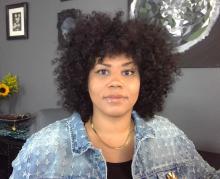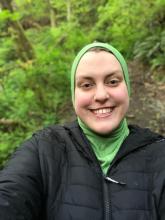Two members of the UW Anthropology Department are dedicated to amplifying and transforming anthropological knowledge and practice through podcasting and public engagement. Yoli Ngandali is a member of the Ngbaka tribe from the Democratic Republic of Congo and a Ph.D. Candidate in archaeology at UW. She uses emerging non-destructive archaeological methods to contribute to Indigenous communities’ capacity to reclaim and reinterpret knowledge gained from museum collections, in partnership with cultural advisors from the Confederated Tribes of Grand Ronde. She co-hosts season 4 of the SAPIENS podcast with Dr. Ora Marek-Martinez from Northern Arizona University. Delaney Glass is a Muslim woman and a Ph.D. Candidate in biological anthropology at UW. She studies the impact of nutritional and psychosocial stress on adolescent pubertal development using multi-system endocrinology. Her collaborative project uses previously collected biomarker and survey data from the Qom Indigenous community in Argentina as well as Jordanian / Syrian youth living in Jordan who participated in a community-driven stress-reduction intervention trial. She is an associate producer of Sausage of Science—the official podcast of the Human Biology Association—along with Dr. Alexandra Niclou from the University of Notre Dame.
Season 4 of SAPIENS, “Our Past is The Future,” is the result of a collaboration between the Society of Black Archaeologists, Indigenous Archaeology Collective, Wenner-Gren Foundation, SAPIENS, and the Cornell Institute for Archaeology and Material Studies. This collaborative effort directly involves collaboration between Chip Colwell (SAPIENS), Danilyn Rutherford (W-G), Adam Smith (CIAMS), Justin Dunnavant and Ayana Flewellen (SBA), and Ora Marek-Martinez and Sara Gonzalez (IAC) to bring Black and Indigenous voices together and at the forefront. It was inspired by the Webinar series “From the Margins to the Mainstream: Black and Indigenous Futures in Archaeology” and the concerted efforts to address the history of anthropology and talk about all the voices currently reshaping the field. Yoli reflects: “As Black and Indigenous people we talk about this all the time, and we are at this point where we need to find a platform to speak out so that we can actually make some changes within our discipline. In this season, we explore how Black and Indigenous archeologists are changing the stories we tell. We use our ways of being and ways of knowing to tell the stories of what is going on.” They engage themes such as repatriation efforts, unmarked graves at boarding schools for Indigenous children and at African American cemeteries, caring relationships to tragic historical events and places, or how Africa and the Caribbean are connected through food. They show how Black and Indigenous visions and insights can be centered to uncover the pride present in histories that are often painful. Through this, they work to build up futures for the next generation of archaeologists and anthropologists.
The Sausage of Science (SoS) is dedicated to disseminating anthropological science to broader audiences. The podcast is hosted by Dr. Chris Lynn at the University of Alabama and Dr. Cara Ocobock, at the University of Notre Dame. The production team facilitates interviews, produce, and publish weekly episodes where they reflect on the role of biological anthropologists in engaging the history of the discipline and conducting cutting-edge, ethical research. They aim to engage the public in reflections on a variety of topics such as bringing feminist perspectives to biological anthropology, the structure of modernity; genetic ancestry, race, and national belonging; how to measure sedentary behavior; public health and immunity; parenting and childhood cognition; racism and racial taxonomy. These are only some of the latest themes in the prolific archive of the podcast, now showcasing 163 episodes. Through conversations with scholars about their work, they also address the unwritten curriculum in academia and attempt to provide resources to help people within academia along the way.
Both Yoli and Delaney insist on the importance of addressing a broad audience—anthropologists at different stages of their education and careers, as well as lay people who may not be familiar with anthropological concepts. They work to unpack the implications of anthropological research and break away from insular conversations. Yoli explains: “Through podcasting, we can really think about how to engage with storytelling” to find how to approach painful stories. For Delaney, dissemination can showcase the value of anthropological perspectives: “A lot of people don’t know what a biological anthropologist or biocultural medical anthropologist is.” It’s thus important to underscore “the theory-driven perspectives we take and the way we do community-engaged work. The focus in our discipline is centered around embracing and understanding contextual and temporal drivers of human variability.”
In the spirit of public-facing conversations, Delaney and Yoli have also contributed to companion series. After founders of the Sausage of Science podcast Chris Lynn and Cara Ocobock edited and contributed to a special issue on #Hackademics in the American Journal of Human Biology, Delaney Glass and Chris Lynn facilitated a follow-up 4-Part #Hackademics webinar series with authors in the series, focused on themes of balancing fieldwork, teaching, and family, mentorship and ‘un-teaching’, communicating across disciplines, and sharing anthropological work beyond our discipline (and getting the academy to count it). In addition, Delaney and Alex hosted in 2021 an episode on making graduate research pivots amidst COVID-19. The SAPIENS Talk Back series through Cornell University allowed graduate students to ask questions directly to speakers. Instructors who wish to develop their curriculum around SAPIENS content are offered two Podcast Teaching Units, with Unit 1 engaging Black Archaeologies and Unit 2 Indigenous Archaeologies.
If you’re interested in getting involved, Delaney & Alex’s terms as Junior Service Fellow with the Human Biology Association are ending soon, they will be looking for new fellows to become podcast contributors. If you’re interested, please contact Chris (cdlynn@ua.edu) or Cara (cocobock@nd.edu). You can contact the Sausage of Science Podcast and Human Biology Association on Facebook, Twitter @HumBioAssoc or on their website: humbio.org/. You can contact Delaney at dglass1@uw.edu, dglass.netlify.app, or @GlassDelaney on Twitter.
And while the SAPIENS project is broadly funded by dozens of people and organizations (the Wenner-Gren Foundation, House of Pod, Society of Black Archaeologists, Indigenous Archaeology Collective, Archaeology Centers Coalition and many more), you can support the Black Trowel Collective, which offers microgrants for graduate students and professionals. Individuals can also join the Society of Black Archaeologists.
Congratulations to both Yoli and Delaney, and thank you for all of your work to make our discipline more engaged and inclusive!

